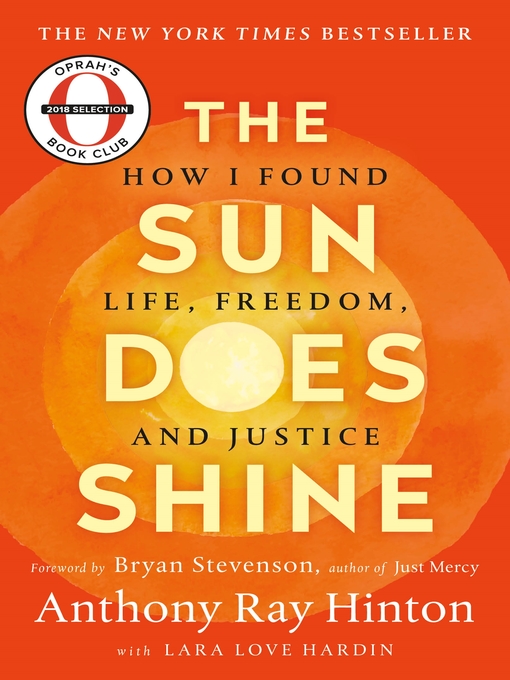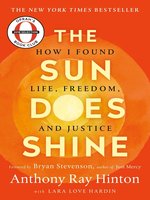-

January 1, 2018
An urgent, emotional memoir from one of the longest-serving condemned death row inmates to be found innocent in America.One night in July 1985, Hinton was locked in a secure warehouse of a supermarket for his overnight shift when, 15 miles away, the assistant manager of a local restaurant was kidnapped at gunpoint, robbed, and shot in the head. Less than a week later, police showed up at Hinton's house to arrest him for that crime and the murders of two other local Alabama restaurant managers. Hinton was black, 29, living at home with his mother, and innocent of all charges. At his trial, his lawyer presented an incompetent defense that failed to refute the state's distorted evidence and several witnesses' false claims. Hinton was found guilty of two counts of capital murder and sentenced to death by electric chair. For the next three decades, he maintained his innocence in solitary confinement on Alabama's death row, where he watched more than 50 men led past his cell to the execution chamber just 30 feet away. The truth of Hinton's innocence and his unshakable faith in God helped him cope with prison life and several failed repeal attempts until Bryan Stevenson, founder and executive director of the Equal Justice Initiative, eventually took up his case and brought it all the way to the Supreme Court. After nearly 30 years, all charges against Hinton were dropped, and he was released from prison in 2015. Woven into vivid descriptions of life behind bars are flashbacks to the author's childhood, court transcripts, police documents, news clippings, and correspondence that reveal the roles racism, poverty, and fear played in creating a deeply biased criminal justice system that punishes the poor and people of color. Stevenson (Just Mercy, 2014) provides a powerful foreword.A heart-wrenching yet ultimately hopeful story about truth, justice, and the need for criminal justice reform.
COPYRIGHT(2018) Kirkus Reviews, ALL RIGHTS RESERVED.
-

Starred review from February 26, 2018
In this intense memoir, Hinton recounts his three-decade nightmare: awaiting execution for crimes he didn’t commit. In 1985, Hinton, then 29, was charged with a series of violent robberies as well as the murders of two restaurant managers in Birmingham, Ala. Hinton passed a polygraph test and was in a locked warehouse during one robbery, but that didn’t prevent an all-white jury from finding him guilty after only two hours (the death penalty recommendation took another 45 minutes). Hinton here provides a convincing description of continued segregation and injustice in the deep South that cages the underclass as effectively as prison walls. His depictions of prison life are wrenching, as when he recalls the 1987 electric chair execution of Wayne Ritter and how the smell of Ritter’s burning flesh “burned my nose and stung my throat.” Forced to hone his mind to withstand overwhelming isolation, Hinton read voraciously and studied his case. With the unwavering support of his mother and his best friend, Hinton created a fulfilling life for himself, which included running a book club for death row inmates. After many years, his dogged pursuit of justice led civil rights attorney Bryan Stephenson to adopt his cause. Hinton was freed from prison in 2015, and now works as a motivational speaker. Hinton’s life is one of inspiration, which he wonderfully relays here in bitingly honest prose.
-

Starred review from February 1, 2018
In 2015, Hinton was released after serving nearly 30 yearshalf of his lifeon Alabama's death row for crimes he didn't commit. His memoir, collaboratively written with Hardin, is a troubling, moving, and ultimately exalting journey through the decades Hinton lived under the threat of death while an unjust system that refused to acknowledge mistakes failed him repeatedly. After barely speaking during his first years on the row, Hinton's natural friendliness and compassion compelled him to connect with his fellow inmates and start a book club. As he experienced the executions of these new friends, Hinton learned to rely on his imaginationwhich took him from his five-by-seven cell to places he'd never beenand never take for granted the unconditional love of his mother and best friend, who never missed a visiting day. Hope eventually appeared in the form of God's best lawyer, Bryan Stevenson, founder of the Equal Justice Initiative and author of Just Mercy (2014). It would take Stevenson and his team, working tirelessly, another 15 years to win Hinton back his freedom. Even more powerful than the crushing terror of serving a death sentence while innocent are Hinton's refusal to be diminished by it and his unwavering commitment to forgiveness. Lighting unfathomable places, Hinton's gripping story asks readers to do the same.HIGH-DEMAND BACKSTORY: With a huge print run, Hinton's incredible story and social-justice star Stevenson, who wrote the foreword, will draw major attention.(Reprinted with permission of Booklist, copyright 2018, American Library Association.)
-

Starred review from April 1, 2018
In 1985, Hinton was charged with capital murder for the killing of two store owners. Despite evidence that he had not committed the crimes, he was found guilty and sentenced to Alabama's death row, where he spent the next 30 years. This book, which is not for the faint of heart, follows two parallel paths. First, it details the legal wrangling involved in Hinton's case up to the intervention of civil rights attorney Bryan Stevenson (author of Just Mercy, who wrote the foreword for this book) and Hinton's release in 2015. Second, it gives a graphic account of life on death row, this being the most powerful part of the text. We learn about the interaction between the condemned and the guards, the cries for mercy, and finally the pungent smell of burning flesh after an execution. How could Hinton find any solace from this? Yet he does. In his closing remarks, he claims to have found life and freedom on death row, a place where the sun does shine. A cryptic remark indeed. VERDICT A must for anyone involved in criminal justice. Suggested reading for anyone interested in learning more about death row and its horrors. [See Prepub Alert, 10/9/17.]--Frances O. Sandiford, formerly with Green Haven Correctional Facility Lib., Stormville, NY
Copyright 2018 Library Journal, LLC Used with permission.
-

April 1, 2018
Arrested in 1985 Alabama and convicted for a crime he did not commit, Hinton spent nearly three decades on death row before his 2015 release. In the intervening years, he decided to survive by serving as a source of spiritual strength to others on death row. With a 100,000-copy announced market distribution.
Copyright 2017 Library Journal, LLC Used with permission.
-
Archbishop Desmond Tutu
"Nelson Mandela spent 27 years in prison for opposing a racist system in South Africa. Anthony Ray Hinton spent 30 years on death row because a racist system still exists in America. Both emerged from their incarceration with a profound capacity to forgive. They are stunning examples of how the most horrendous cruelty can lead to the most transcendent compassion. The Sun Does Shine is both a cautionary tale for all who think that a great nation can easily forget its past and inspiring proof of the inability to condemn a man's capacity for hope, love, and joy. An amazing and heartwarming story, it restores our faith in the inherent goodness of humanity."
-
Bryan Stevenson, New York Times Bestselling Author, Just Mercy
"No one I have represented has inspired me more than Anthony Ray Hinton and I believe his compelling and unique story will similarly inspire our nation and readers all over the world."
-
Richard Branson
"If there is ever a story that needs to be told, it is this one. Anthony Ray Hinton is extraordinary, an example to us all of the power of the human spirit to rise above complete injustice. He is using his experience as a way to turn the broken criminal justice system upside down. He is a brilliant storyteller, and his book will make people laugh, cry, and change their own lives for the better. It will also inspire people to never accept the unacceptable, like the death penalty. The Sun Does Shine will be a book that people all around the world will never forget."








